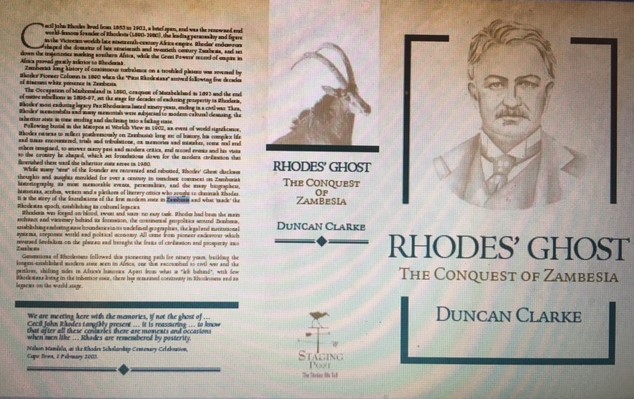by Hannes Wessels
I don’t know how many books have been written about Cecil John Rhodes, but Duncan Clarke’s magisterial, ‘Rhodes’ Ghost’ might be close to the final word on this extraordinary man, who most of the modern world, thanks to the twisters of history who dominate academia, has learned to loathe.
Just the introduction will startle and displease his myriad critics. Clarke writes at some length about the events that unfolded as Rhodes’ cortege made its long rail journey from the Cape, to his final resting place in the Matopos Mountains. Along the route, mourners representing every race, religion and political persuasion, including the Afrikaners who had many reasons to resent Rhodes, turned out in their droves to say farewell and pay their last respects. At his burial place, the Matabele Indunas, and their warriors, in their thousands, came to honour him with, Bayete; their thunderous royal salute.
Imagining this scene, I wondered what would have become of Ntokozo Qwabe and Chumani Maxwele if they had been present on this occasion and positioned to show their feelings about Rhodes. Qwabe, the beneficiary of a Rhodes Scholarship, led the call to have Rhodes’ statue removed from Oriel College, Oxford. And Maxwele, earned international acclaim when he hurled a bucket of human excrement at his statue on the campus of the University of Cape Town. This triggered the ‘Rhodes Must Fall’ protest movement which succeeded in having the ‘offensive’ figurine removed. Both Oriel College and UCT, were subsidised by Rhodes.
There is a lesson in the irony and the fickleness of human nature, that black people of the time when Rhodes lived, who had been at war with men hired by Rhodes, respected and revered him, and those who live over a 100 years after his death, who benefit from his foresight and generosity, despise him.

The author writes from the grave, in the first person, masquerading as Rhodes, looking at events through the eyes of the deceased, before and after his subject’s death, trying to make sense of all that followed his demise. He tries to explain Rhodes’ burning desire to occupy the country and ultimately colonise it. We are left in no doubt that the magnificent wilderness north of the Limpopo captivated Rhodes and he became driven by something almost mystical in his quest for conquest and nation-building.
Clarke has exhaustively researched, not only Rhodes but the turbulent times that swirl around the man and his legacy, making this book a mine of information for anyone interested in over 500 years of the history of the region. For me, as someone who thought he knew a lot about the man, I was rudely surprised to discover how wrong I was.
For instance, I did not know about Sara Liebenberg, one of two white girls, captured by Mzilikazi’s Ndebele in a raid on Hendrik Potgieter’s Boers, and the pivotal role she would later play in the rise to power of Lobengula, as his surrogate sister. I also did not fully understand the extent of Rhodes’ physical courage which he demonstrated on several occasions, riding into battle against the Ndebele, unarmed. It came as a surprise to read that 63% of the whites who went to work on the Beira-Umtali railway line, died; most from malaria, some following attacks by wild animals. Or that an American mining engineer, by the name of John Hammond played, probably the pivotal role in organising and motivating the botched Jameson Raid that forced Rhodes to resign as Prime Minister of the Cape.
It was also interesting to read of the level of the malevolence directed at Rhodes by the liberal establishment back in Great Britain. Just as they continued to do throughout the years of white rule in the country, they consistently relied on a series of falsehoods to demonise the man and thwart his efforts to introduce ‘civilised’ rule in the territory.
Prominent in the attacks on Rhodes was Randolph Churchill, father of Winston, who seemed to develop an intense dislike of the man who hosted him on his visit to the country. The spicy revelation about Churchill is his irascible behaviour may have been connected to the fact he was suffering from syphilis at the time of his visit.
Writing as Rhodes, Clarke reminds the reader that the land that would later be know as Zimbabwe, was, “.. prone to episodic cycles, often savage in nature or savaged by Nature, and at times close to forms of medieval barbarism.” And that, “…Shona clans were plundered, used as maholi or slaves in military impis, or as forced labour, while non-Ndebele villages and subordinated chiefdoms paid tribute in cattle or produce. The Ndebele kings reigned supreme.” He refers to Mzilikazi’s military regime, “.. as if Sparta had been established in the bushveld..” and marvels at the power and reach of this great and ruthless warrior tribe. He insists, the famous missionaries; John Moffat and David Livingstone shared his views on the need to act decisively in a bid to stop the Ndebele predating upon the subjugated Shona tribes and thereby end the endemic slavery.
The Zimbabwean author and historian, Stanlake Samkange, comes up with a familiar excuse for the reign of terror that Rhodes and his men interrupted. “It is true that Lobengula’s impis killed many people and he ordered countless men, women and children to be killed for one reason or another. But in this he was merely the product of his society and what he did was the practice of his time.” Then, as now, it appears, black on black violence was acceptable, but any white intervention, is instantly condemned, no matter how well intentioned.
Back in London, leading the anti-imperialists, Henry du Pré Labouchère, labelled the occupation of Mashonaland a ‘war crime’. He received strong support from the Aborigines Protection Society, Exeter Hall and lobbies in Little England who “…depicted the settlers as freebooters, marauders, even murderers.” Needless to state, they too had nothing to say about the plight of the Shona at the hands of their Ndebele vanquishers.
Critics will inevitably scorn this version of events and insist Rhodes’ real motivation was the accumulation of further wealth in pursuit of gold and diamonds. But this does not bear scrutiny. Rhodes knew he was not going to live to reap the rewards of his adventurism and put enormous strain on his substantial financial resources by refusing to accept defeat in his yearning for conquest.
We are reminded that the entire intervention and the subsequent occupation was paid for by Rhodes and that the British exchequer contributed precisely nothing, while sitting on the side-lines, waiting to see how events played out. In a flagrant display of blatant opportunism, Whitehall waited until the dust had settled, all the dead who fought in the rebellions had been buried and a country was finally starting to flourish. Then they stepped in and demanded the huge sum at the time, of £2,000,000, be paid them for the land then occupied by the Europeans. The Settlers were outraged, but their options were few and the payment was made.
This is a big book; over 800 pages and I’m only half-way through it, but I’m fascinated.
Discover more from Africa Unauthorised
Subscribe to get the latest posts sent to your email.



2020 at 11:00 said:
Thanks as always Hannes, please copy me in when this book is available.
Sure George
If you could kindly let me know when this book is published and the cost. I reside in the UK
Many thanks
Please add my name to the list. I would live to get a copy when it is released.
Count me in for a copy too please Mr. Wessels. My grand-children should know the history of Rhodesia and its founder without the Marxist slant.
I am presuming that you are able to re-publish this book Hannes. I can’t find it anywhere and would be extremely grateful for advice on when it is available and whether I can book 3 copies for my family ~ have been in Africa since the 1820’s.
Well with all that family history I really think you’ll love this book Fay. We should have books available in June and we will let you know.
As a Rhodie I am always interested in anything of historical value. Yes would love to get my hands on a copy of the book. Please let me know when it comes out. Yours Dave
Will let you know Dave.
Would like to know when this book is published so that I can order a copy.
We hoping to have books in stock in June Bruce.
Thanks as always Hannes, please copy me in when this book is available.
Sure will do Ian.
great. i thought hannes wessels book a handful of hard men mindblowing
i would definitely like to buy a copy.please advise as soon as one is available
Sure Chris. Will do.
Thank you Hannes , as all ways another good and interesting read.I must get the book. They say the Shona were about 90,000 in about 1890 plus ,so I wonder what their population would have been in say the 1980’s without medicine and stopping their slaughter by the Matabele. ?
Good question Don. What makes this book very interesting is the author does not dodge controversy and he takes on Rhodes’ critics with facts, not mere opinion.
Hi Don – the African population was originally estimated at 40,000 which effectively meant the equivalent of 1 per 10 square kilometres in the country. Essentially the country was largely uninhabited when the whites moved in.
Outstanding Hannes – thanks
Cheers, Hannes. Thanks for the wonderful review – looks like this book is a true gem. Would you please keep me in the loop and notify when this book will be available? I’d really appreciate it. My MA thesis was on Rhodesian history, so this new work on Mr. Rhodes will be very useful for my research. (Besides, I spent three good years in Zim and been to Matopos eight times :))
Sure thing Sergei. Please stay in touch. We expect availability in June?? You will get a lot out of it because he goes into a lot of detail, not only about Rhodes, but the history of the time.
H. Wessels
Please could you email me about how to get Duncan Clarke’s book on CJ Rhodes? No mention of in in Amazon or WWW.
RICHARD Teague ex Mutare and UBHS
I’ll have to keep you posted Rich. But we will have stock when it’s released and that is probably end of May now?
How do I buy a copy of the Rhodes book? Price?
Published by Protea John. We at EMM will also have stock soon as its available.
Interesting! Hannes – who is the book published by?
Protea Books
A writer I intend to read some day. I wonder-what if Rhodes had lived as long as Smuts?I’ve had a vague dream of him and Teddy Roosevelt working together.
Well you’ll enjoy this Mark. They can say what they like about CJR, but he was a visionary and he had great plans for Africa. I think he and Roosevelt had a lot in common.
Qwabe and his ilk are the proof that education, even the best of it (Oxford) does not change the mentality of people who are angry that they have been born black. This is a race that thinks everything is the fault of the whites including their procreation. Mugabe was a serious case of this disorder.
WOW, that’s piqued my interest will definitely be getting a copy of this